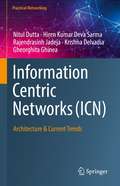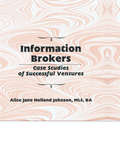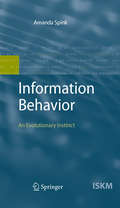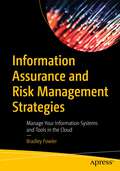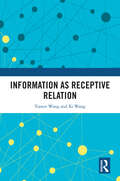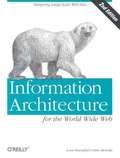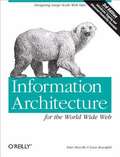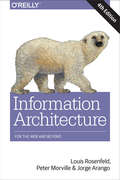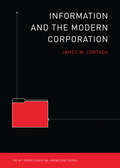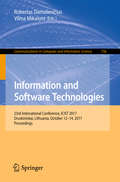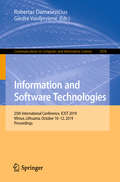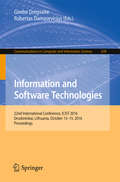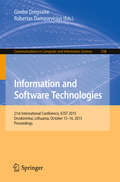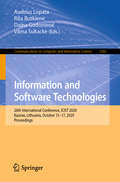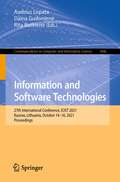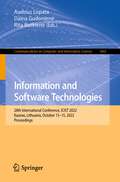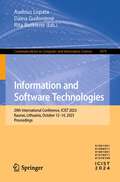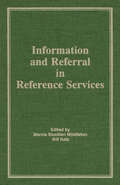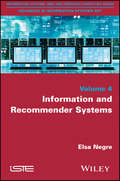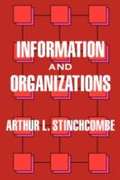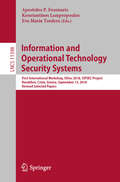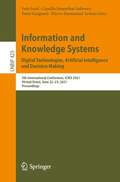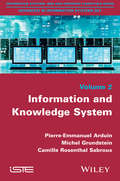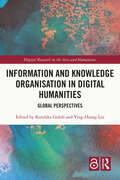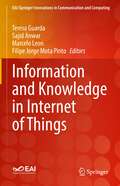- Table View
- List View
Information Centric Networks: Architecture & Current Trends (Practical Networking)
by Nitul Dutta Hiren Kumar Sarma Rajendrasinh Jadeja Krishna Delvadia Gheorghita GhineaThis book aimed at bringing an insight to the ICN network, particularly various architectures, issues and challenges in the new networking paradigm. The book starts with an introduction to the new promising concept of ICN and its origin along with the reason behind this interesting innovation. Different architectures proposed so far in support of implementing the ICN is also discussed in details. Few of the challenges of ICN implementation are enlisted as caching, naming, routing, and security. Each of these challenges with recent development is covered in individual chapters. Moreover, integration of current trends in communication and computing like software defined networking and machine learning approach are another area that this book is focusing. All these chapters highlight the recent developments reported in the area and also discusses the future trends. The book provides an overview of the recent developments in future internet technologies, bringing together the advancements that have been made in ICN. The book includes three unique chapters in the field of ICN research. The first, is the SDN framework for implementing ICN by decoupling data and control plan. The machine learning models for predicting future trends in network traffic and other management activities is another important chapter. This chapter includes the possibilities of using machine learning models for trend prediction to help network administrators and service providers to take care of unexpected sudden change traffic pattern and user behaviour. The third most vital chapter is the security issues in ICN. This chapter includes various facts that influences the security of ICN. Issues involved in naming, caching and routing are discussed separately along with few recent works in these areas. Various types of attacks in ICN are also part of the discussion. The stated book would be useful for researchers in this area and will work as a reference for future work. Moreover, the content of the book would also be suitable as a supporting material for undergraduate and graduate level courses in computer science and electrical engineering.
Information Brokers: Case Studies of Successful Ventures
by Alice J JohnsonThe perfect guide to jumpstart an information brokerage firm!Here is an instructive guide for any librarian planning to start an information brokerage, whether as an entrepreneur or as a member of a document delivery group in a library. The methods used by successful firms and librarians are gathered together in this helpful book. Information Brokers: Case Studies of Successful Ventures identifies specific skills and relevant characteristics required to establish a successful information brokerage firm, and provides a descriptive model to assist you in running an information brokerage firm as a viable business venture.This guide is full of information gleaned from questionnaires sent to successful information brokerages throughout the United States and from in-depth interviews conducted with the principals of six of these firms. During the interviews, these individuals were questioned about many relevant issues of the field including: establishment of the business company history what specifically made each business a success general concepts concerning information brokering pertinent literature that helped them, and can help youLibrarians looking for a career change or who find their jobs in jeopardy as a result of budget cuts may want to look into the field of information brokerage. With Information Brokers: Case Studies of Successful Ventures, you can discover if the information brokerage field is for you!
Information Behavior
by Amanda SpinkInformation behavior has emerged as an important aspect of human life, however our knowledge and understanding of it is incomplete and underdeveloped scientifically. Research on the topic is largely contemporary in focus and has generally not incorporated results from other disciplines. In this monograph Spink provides a new understanding of information behavior by incorporating related findings, theories and models from social sciences, psychology and cognition. In her presentation, she argues that information behavior is an important instinctive sociocognitive ability that can only be fully understood with a highly interdisciplinary approach. The leitmotivs of her examination are three important research questions: First, what is the evolutionary, biological and developmental nature of information behavior? Second, what is the role of instinct versus environment in shaping information behavior? And, third, how have information behavior capabilities evolved and developed over time? Written for researchers in information science as well as social and cognitive sciences, Spink's controversial text lays the foundation for a new interdisciplinary theoretical perspective on information behavior that will not only provide a more holistic framework for this field but will also impact those sciences, and thus also open up many new research directions.
Information Assurance and Risk Management Strategies: Manage Your Information Systems and Tools in the Cloud
by Bradley FowlerLearn how to deploy information assurance risk management strategies that align with the National Institute of Standards and Technology’s recommendations. This book will show you how to implement information assurance risk management strategies within your organization. Aimed at system administrators and cybersecurity practitioners, author Bradley Fowler first walks you through how to assess known risks in your organization, understand why using a risk mitigation security strategy control profile is essential, and how to create one for your organization. You will then learn how to develop a risk factor table, outlining descriptions for each risk factor within your organization and which software applications you’ll need to rely on for daily business communication and operations. You will also see how to assess and categorize the level of risk within each technology tool, as well as the impact of an information security breach on the organization. As you progress through the book, you'll review privacy issues relating to your organization, develop and manage a privacy compliance risk profile, and develop and manage a privacy compliance control profile. Additionally, you will gain insight into creating a privacy compliance risk mitigation strategy that helps protect your organization even as security threats evolve. Take the first step to safeguarding your company’s highly valuable information assets today! What You'll Learn Understand what information assurance is and how it relates to risk management strategiesAssess, develop, implement, and manage risk management strategies for corporate information systems, technology, and cloud environmentsDevelop and utilize information usage profiles and risk factor tablesUnderstand the value of data encryption and usage of private and public key exchange for information assurance and security Who This Book Is For Information system and cloud architects responsible for developing, implementing, and managing corporate information systems and cloud environments.
Information as Receptive Relation
by Xi Wang Tianen WangThis book aims to revolutionize information research by introducing a receptive relation understanding of information, which systematically unveils its fundamental characteristics: created ex nihilo, emergence, reciprocity and shareability.Through a thorough exploration of organismic and sensory receptivity, the book establishes a mechanistic foundation for understanding the nature of information. It navigates the origins of biological information and leads readers into a new era of information studies. Offering a fresh perspective on the nature of information, it delves into its physical, digital, and ideational encodings, as well as the ideational system built upon them. The book sheds light on critical issues such as quantum manifestation of information and the fundamental laws governing the relationship between information and matter/energy. It also dispels common misconceptions about information and its role in the evolution of information civilization.The book provides valuable insights into understanding artificial general intelligence and the mysteries of consciousness and life. It will be of interest to researchers and students of information philosophy, information science, and artificial intelligence.
Information Architecture for the World Wide Web, 2nd Edition
by Peter Morville Louis RosenfeldWant to design distinctive, cohesive web sites that "work"? This updated bestseller teaches you how to blend aesthetics and mechanics for web sites and intranets that are easy to navigate and appealing to your users, scalable and simple to maintain. Most books on web development concentrate on either the graphics or the technical issues of a site. This book focuses on the framework that holds the two together.
Information Architecture for the World Wide Web
by Peter Morville Louis RosenfeldThe post-Ajaxian Web 2.0 world of wikis, folksonomies, and mashups makes well-planned information architecture even more essential. How do you present large volumes of information to people who need to find what they're looking for quickly? This classic primer shows information architects, designers, and web site developers how to build large-scale and maintainable web sites that are appealing and easy to navigate. The new edition is thoroughly updated to address emerging technologies -- with recent examples, new scenarios, and information on best practices -- while maintaining its focus on fundamentals. With topics that range from aesthetics to mechanics, Information Architecture for the World Wide Web explains how to create interfaces that users can understand right away. Inside, you'll find:An overview of information architecture for both newcomers and experienced practitioners The fundamental components of an architecture, illustrating the interconnected nature of these systems. Updated, with updates for tagging, folksonomies, social classification, and guided navigationTools, techniques, and methods that take you from research to strategy and design to implementation. This edition discusses blueprints, wireframes and the role of diagrams in the design phaseA series of short essays that provide practical tips and philosophical advice for those who work on information architectureThe business context of practicing and promoting information architecture, including recent lessons on how to handle enterprise architectureCase studies on the evolution of two large and very different information architectures, illustrating best practices along the wayHow do you document the rich interfaces of web applications? How do you design for multiple platforms and mobile devices? With emphasis on goals and approaches over tactics or technologies, this enormously popular book gives you knowledge about information architecture with a framework that allows you to learn new approaches -- and unlearn outmoded ones.
Information Architecture: For the Web and Beyond
by Peter Morville Louis Rosenfeld Jorge ArangoInformation architecture (IA) is far more challenging--and necessary--than ever. With the glut of information available today, anything your organization wants to share should be easy to find, navigate, and understand. But the experience you provide has to be familiar and coherent across multiple interaction channels, from the Web to smartphones, smartwatches, and beyond.To guide you through this broad ecosystem, this popular guide--now in its fourth edition--provides essential concepts, methods, and techniques for digital design that have withstood the test of time. UX designers, product managers, developers, and anyone involved in digital design will learn how to create semantic structures that will help people engage with your message.This book includes:An overview of IA and the problems it solves for creating effective digital products and servicesA deep dive into IA components, including organization, labeling, navigation, search, and metadataProcesses and methods that take you from research to strategy, design, and IA implementation
Information and the Modern Corporation (The MIT Press Essential Knowledge series)
by James W. CortadaA guide to information as the transformative tool of modern business.While we have been preoccupied with the latest i-gadget from Apple and with Google's ongoing expansion, we may have missed something: the fundamental transformation of whole firms and industries into giant information-processing machines. Today, more than eighty percent of workers collect and analyze information (often in digital form) in the course of doing their jobs. This book offers a guide to the role of information in modern business, mapping the use of information within work processes and tracing flows of information across supply-chain management, product development, customer relations, and sales. The emphasis is on information itself, not on information technology. Information, overshadowed for a while by the glamour and novelty of IT, is the fundamental component of the modern corporation.In Information and the Modern Corporation, longtime IBM manager and consultant James Cortada clarifies the differences among data, facts, information, and knowledge and describes how the art of analytics has all but eliminated decision making based on gut feeling, replacing it with fact-based decisions. He describes the working style of “road warriors,” whose offices are anywhere their laptops and cell phones are and whose deep knowledge of a given topic becomes their medium of exchange.Information is the core of the modern enterprise, and the use of information defines the activities of a firm. This essential guide shows managers and employees better ways to leverage information—by design and not by accident.
Information and Software Technologies
by Robertas Damaševičius Vilma MikašytėThis book constitutes the refereed proceedings of the 23nd International Conference on Information and Software Technologies, ICIST 2017, held in Druskininkai, Lithuania, in October 2017.The 51 papers presented were carefully reviewed and selected from 135 submissions. The papers are organized in topical sections on information systems; business intelligence for information and software systems; software engineering; information technology applications.
Information and Software Technologies: 25th International Conference, ICIST 2019, Vilnius, Lithuania, October 10–12, 2019, Proceedings (Communications in Computer and Information Science #1078)
by Robertas Damaševičius Giedrė VasiljevienėThis book constitutes the refereed proceedings of the 25th International Conference on Information and Software Technologies, ICIST 2019, held in Vilnius, Lithuania, in October 2019.The 46 papers presented were carefully reviewed and selected from 121 submissions. The papers are organized in topical sections on information systems; business intelligence for information and software systems; information technology applications; software engineering.
Information and Software Technologies
by Giedre Dregvaite Robertas DamaseviciusThis book constitutes the refereed proceedings of the 20th International Conference on Information and Software Technologies, ICIST 2014, held in Druskininkai, Lithuania, in October 2014. The 34 papers presented were carefully reviewed and selected from 68 submissions. The papers are organized in topical sections such as information systems; business intelligence for information and software systems; software engineering; information technology applications.
Information and Software Technologies: 21st International Conference, Icist 2015, Druskininkai, Lithuania, October 15-16, 2015, Proceedings (Communications In Computer And Information Science #538)
by Giedre Dregvaite Robertas DamaseviciusThis book constitutes the refereed proceedings of the 21th International Conference on Information and Software Technologies, ICIST 2015, held in Druskininkai, Lithuania, in October 2015. The 51 papers presented were carefully reviewed and selected from 125 submissions. The papers are organized in topical sections on information systems; business intelligence for information and software systems; software engineering; information technology applications.
Information and Software Technologies: 26th International Conference, ICIST 2020, Kaunas, Lithuania, October 15–17, 2020, Proceedings (Communications in Computer and Information Science #1283)
by Audrius Lopata Rita Butkienė Daina Gudonienė Vilma SukackėThis book constitutes the refereed proceedings of the 26th International Conference on Information and Software Technologies, ICIST 2020, held in Kaunas, Lithuania, in October 2020.The 23 full papers and 7 short papers presented were carefully reviewed and selected from 78 submissions. The papers are organized in topical sections on business intelligence for information and software system; software engineering; information technology applications.
Information and Software Technologies: 27th International Conference, ICIST 2021, Kaunas, Lithuania, October 14–16, 2021, Proceedings (Communications in Computer and Information Science #1486)
by Audrius Lopata Daina Gudonienė Rita ButkienėThis book constitutes the refereed proceedings of the 27th International Conference on Information and Software Technologies, ICIST 2021, held in Kaunas, Lithuania, in October 2021.The 24 full papers and 6 short papers presented were carefully reviewed and selected from 79 submissions. The papers discuss such topics as business intelligence for information and software systems, intelligent methods for data analysis and computer aided software engineering, information technology applications, smart e-learning technologies and applications, language technologies.
Information and Software Technologies: 28th International Conference, ICIST 2022, Kaunas, Lithuania, October 13–15, 2022, Proceedings (Communications in Computer and Information Science #1665)
by Audrius Lopata Daina Gudonienė Rita ButkienėThis book constitutes the refereed proceedings of the 28th International Conference on Information and Software Technologies, ICIST 2022, held in Kaunas, Lithuania, in October 2022.The 23 full papers and 3 short papers presented were carefully reviewed and selected from 66 submissions. The papers discuss such topics as business intelligence for information and software systems, intelligent methods for data analysis and computer aided software engineering, information technology applications, smart e-learning technologies and applications, language technologies.
Information and Software Technologies: 29th International Conference, ICIST 2023, Kaunas, Lithuania, October 12–14, 2023, Proceedings (Communications in Computer and Information Science #1979)
by Audrius Lopata Daina Gudonienė Rita ButkienėThis book constitutes the refereed proceedings of the 29th International Conference on Information and Software Technologies, ICIST 2023, held in Kaunas, Lithuania, in October 2023.The 27 full papers included in this volume were carefully reviewed and selected from 75 submissions. These proceedings contain a diverse array of research and insights in the field of Information Technology and related areas, such as: intelligent systems and software engineering advances, intelligent methods for data analysis and computer aided software engineering, language technologies and smart e-learning applications, AI-based it solutions.
Information and Referral in Reference Services
by Linda S KatzThis book investigates a wide variety of situations and models which fall under the umbrella of information and referral. It examines traditional views in public libraries and library systems as well as descriptions of programs in nontraditional settings, such as academic libraries. A human services perspective is explored and research models are presented.
Information and Recommender Systems
by Elsa NegreInformation is an element of knowledge that can be stored, processed or transmitted. It is linked to concepts of communication, data, knowledge or representation. In a context of steady increase in the mass of information it is difficult to know what information to look for and where to find them. Computer techniques exist to facilitate this research and allow relevant information extraction. Recommendation systems introduced the notions inherent to the recommendation, based, inter alia, information search, filtering, machine learning, collaborative approaches. It also deals with the assessment of such systems and has various applications.
Information and Organizations
by Arthur L. StinchcombeIn a mix of theoretical insights and anecdotal material, this book explores the ins and outs of organizations from both a macro and micro perspective that has long confronted business people and those interested in organizational theory.
Information and Operational Technology Security Systems: First International Workshop, IOSec 2018, CIPSEC Project, Heraklion, Crete, Greece, September 13, 2018, Revised Selected Papers (Lecture Notes in Computer Science #11398)
by Apostolos P. Fournaris Konstantinos Lampropoulos Eva Marín TorderaThis book constitutes the refereed proceedings of the First International Workshop, IOSec 2018, sponsored by CIPSEC, held in Heraklion, Crete, Greece, in September 2018. The 12 full papers presented were carefully reviewed and selected from 22 submissions. They were organized in topical sections named: Critical Infrastructure Cybersecurity Issues; CyberSecurity Threats, Assessment and Privacy; and Vulnerability and Malware Detection.
Information and Knowledge Systems. Digital Technologies, Artificial Intelligence and Decision Making: 5th International Conference, ICIKS 2021, Virtual Event, June 22–23, 2021, Proceedings (Lecture Notes in Business Information Processing #425)
by Inès Saad Camille Rosenthal-Sabroux Faiez Gargouri Pierre-Emmanuel ArduinThis book constitutes the thoroughly refereed proceedings of the 5th International Conference on Information and Knowledge Systems, ICIKS 2021, which was held online during June 22-23, 2021.The International Conference on Information and Knowledge Systems (ICIKS 2021) gathered both researchers and practitioners in the fields of Information Systems, Artificial Intelligence, Knowledge Management and Decision Support. ICIKS seeks to promote discussions on various organizational, technological, and socio-cultural aspects of research in the design and use of information and knowledge systems in organizations. The 10 full and 2 short papers presented in this volume were carefully reviewed and selected from 32 submissions. They were organized in topical sections as follows: knowledge systems and decision making; machine learning, recommender systems, and knowledge systems; and security, artificial intelligence, and information systems.
Information and Knowledge Systems
by Michel Grundstein Camille Rosenthal-Sabroux Pierre-Emmanuel ArduinThe purpose of this book is to question the relationships involved in decision making and the systems designed to support it: decision support systems (DSS). The focus is on how these systems are engineered; to stop and think about the questions to be asked throughout the engineering process and, in particular, about the impact designers' choices have on these systems. This therefore involves identifying the elements of the problem of decision support systems engineering: the main objects and dimensions to be considered and the relationships they involve, issues at the levels of the decision-maker, of the organization (and even of society), the general approach to which to subscribe and so on.
Information and Knowledge Organisation in Digital Humanities: Global Perspectives (Digital Research in the Arts and Humanities)
by Koraljka Golub Ying-Hsang LiuInformation and Knowledge Organisation explores the role of knowledge organisation in the digital humanities. By focusing on how information is described, represented and organised in both research and practice, this work furthers the transdisciplinary nature of digital humanities. Including contributions from Asia, Australia, Europe, North America and the Middle East, the volume explores the potential uses of, and challenges involved in, applying the organisation of information and knowledge in the various areas of Digital Humanities. With a particular focus on the digital worlds of cultural heritage collections, the book also includes chapters that focus on machine learning, knowledge graphs, text analysis, text annotations and network analysis. Other topics covered include: semantic technologies, conceptual schemas and data augmentation, digital scholarly editing, metadata creation, browsing, visualisation and relevance ranking. Most importantly, perhaps, the book provides a starting point for discussions about the impact of information and knowledge organisation and related tools on the methodologies used in the Digital Humanities field. Information and Knowledge Organisation is intended for use by researchers, students and professionals interested in the role information and knowledge organisation plays in the Digital Humanities. It will be essential reading for those working in library and information science, computer science and across the humanities.
Information and Knowledge in Internet of Things (EAI/Springer Innovations in Communication and Computing)
by Teresa Guarda Sajid Anwar Marcelo Leon Filipe Jorge Mota PintoThis book provides readers with an insight into information and knowledge in the Internet of Things, in particular an investigation of data management and processing, information extraction, technology, knowledge management, knowledge sharing, knowledge co-creation, knowledge integration, and the development of new intelligent services available anytime, anywhere, by anyone. The authors show how IoT enables communication and ubiquitous computing between global citizens, networked machines and physical objects, providing a promising vision of the future integrating the real world of knowledge agents and things with the virtual world of information.
